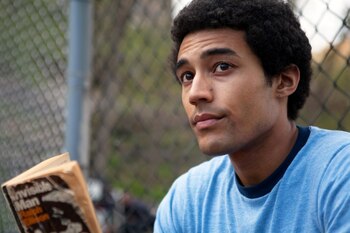
Last summer, Richard Tanne wrote and directed "Southside With You," a speculative but utterly convincing day-in-the-life drama about Obama's first date with a law-office mentor named Michelle Robinson. With "Barry," director Vikram Gandhi visits Obama's life a few years earlier, when he was a student at Columbia University, having just transferred from Occidental College in California.
As "Barry" opens, the title character is on a plane over Manhattan, smoking and reading a letter from his estranged father, who has spent most of his son's life in Kenya. Having grown up in Hawaii, reared for the most part by his white grandparents, Barack Obama – still known as "Barry" to his family and friends – receives a rough, intimidating, almost completely alien impression of New York.
After being forced to sleep outdoors his first night in town, he finally gains access to the apartment he will share with the easygoing Will ("Boyhood's" Ellar Coltrane) and his coked-up, party-hearty landlord, a motor-mouthed Pakistani named Saleem (Avi Nash, in a scene-stealing performance). Plunging into his studies, New York street life and self-exploration that gains an extra sense of urgency considering his own complicated past – not to mention what the audience knows about his future – Barry begins to forge his own identity, often despite political and personal expectations that inform that tricky, often contradictory process.
The chief foil for Barry's explorations is Charlotte (Anya Taylor-Joy), an exuberant, openhearted fellow student whom screenwriter Adam Mansbach has created as a composite of the white women Obama dated in college. In one of "Barry's" several vividly atmospheric scenes, Charlotte takes Barry to a dance club where New York's free-form pluralism is on ecstatically hedonistic display. Still, when Barry meets Charlotte's parents, a startling encounter in the Yale Club men's room reminds him of his persistent sense of not belonging. During a pickup basketball game, Barry befriends PJ (Jason Mitchell), who serves as an ambassador of sorts to the city's African-American community. After a violent encounter at a raucous house party, Barry is feeling just as dislocated. "This ain't my scene," he admits.
The Australian actor Devon Terrell delivers a thoroughly persuasive, ultimately affecting portrayal of a future statesman who, while still in his early 20s, was going through a period of geographical and psychic dispossession – a painful moment underscored by the arrival of his sharp-witted mother Ann (Ashley Judd), whose larger-than-life personality gives "Barry" a welcome jolt of energy. Although "Barry" takes a page from "Southside With You" in using Obama's relationships with women as a conceit for his internal struggles, structurally this is the more expansive, layered film. We not only see Barry work out his feelings about race and identity through his sometimes heartbreaking encounters with Charlotte, but with PJ, Saleem, Will and – in the film's most pointedly effective confrontation – a white classmate who early in the film complains that "everything always comes back to slavery."
Of course "Barry" takes place in 1981, just as concepts of political correctness, identity politics and unexamined privilege were taking hold in campus culture. If they're not explicitly invoked, those public debates are anticipated in a carefully observed movie that, while clearly well grounded in Obama's own books and recollections, uses creative license to convey more subtle truths about resisting reductive, existentially stifling labels. In that sense, "Barry" may specifically be about the outgoing president, but it will carry familiar resonance to anyone who's ever been young, gifted and a little bit at sea.
—
"Barry," 104 minutes, will begin streaming Friday on Netflix.
Author Ann Hornaday
Source The Washington Post
Últimas Noticias
Eduardo Vischi: “Lo que más le gusta al peronismo es romper el equilibrio fiscal y darle plata al que sea”
El presidente del bloque UCR del Senado habló sobre la condena por corrupción a Cristina Kirchner, los proyectos que impulsa la oposición y la ampliación de la Corte. Confirmó su intención de ser candidato en Corrientes

Petroperú se prepara para un alza general de los combustibles por la guerra: “Se trasladará el precio a los consumidores”, estima Narváez
ENTREVISTA. El presidente de la petrolera anticipa un incremento del precio de las gasolinas, diésel y GLP por la escalada del conflicto Israel-Irán. Suba del petróleo y sus derivados escoltará la inflación de alimentos, afirmó

Triplex de la Once sorteo 3: Resultados de hoy 22 junio
Enseguida los resultados del Sorteo 3 de las 14:00 horas dados a conocer por Juegos Once, descubra si ha sido uno de los ganadores

Inti Raymi 2025: detalle de las actividades y horarios de la Fiesta del Sol en Cusco
Se aproxima la celebración más importante del calendario andino. Ritualidades ancestrales, danzas tradicionales, procesiones religiosas y actos culturales se unirán en un despliegue sin precedentes este 24 de junio

Médico peruano en Israel pide ser repatriado junto a su esposa a Perú: hospital donde trabajaba fue bombardeado
Misil balístico iraní impactó sobre la ciudad de Beersheba, donde Hugo Aspiazu Oliveira vive junto a su esposa y otros tres peruanos adultos mayores




